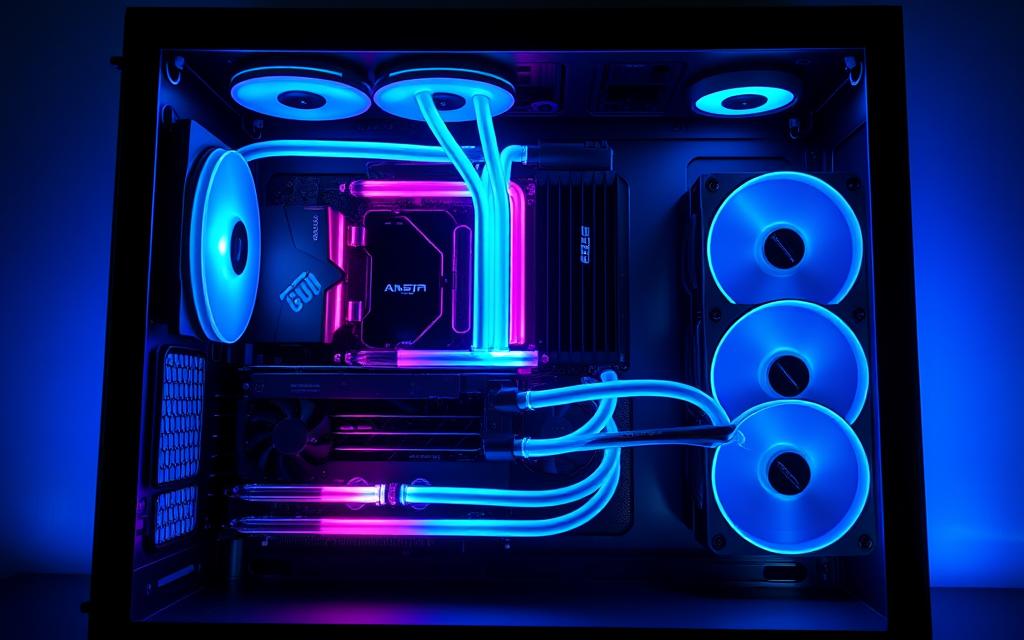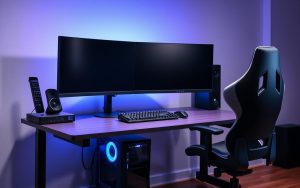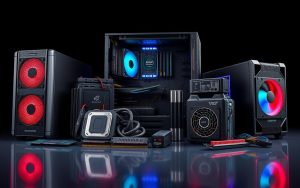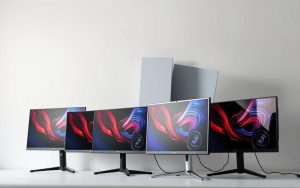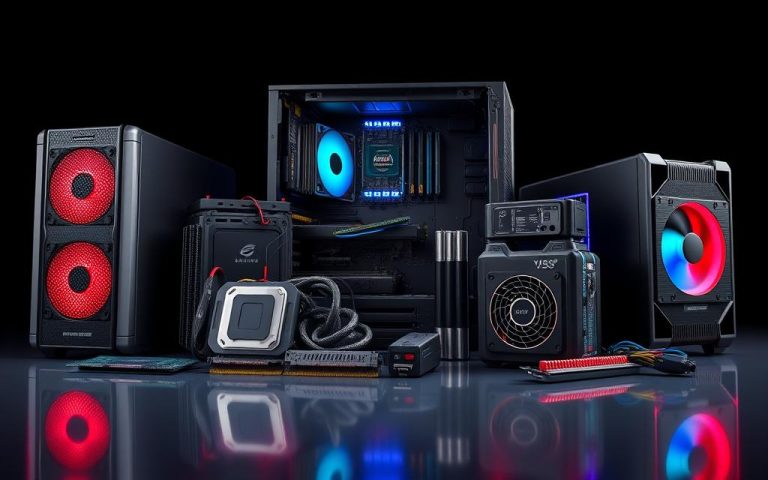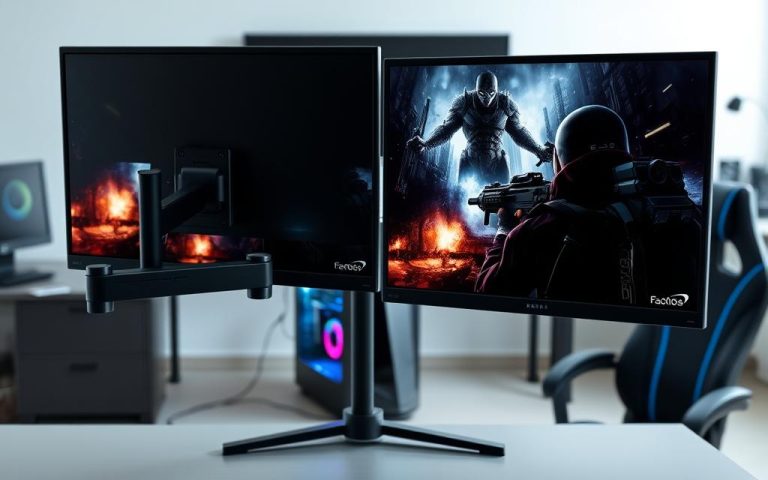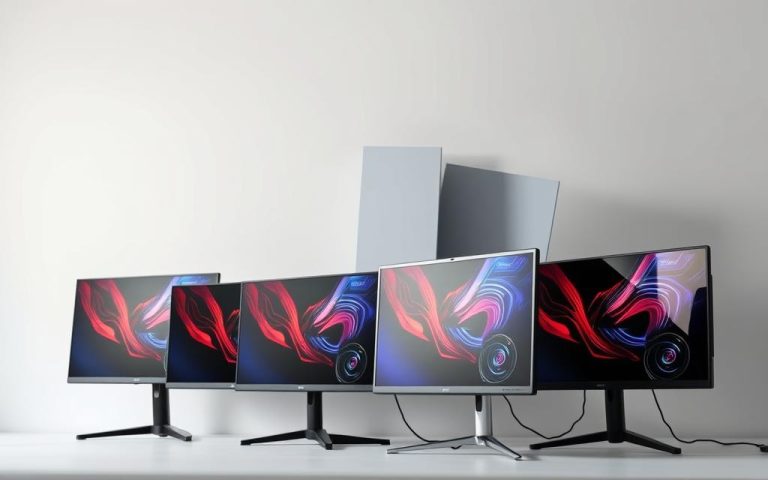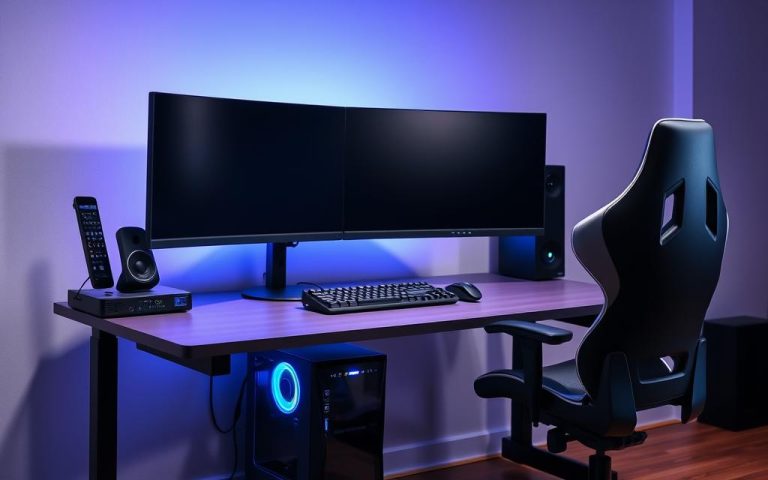Choosing the Best Liquid Cooling for Your Gaming PC
Liquid cooling is a sophisticated approach for managing heat in high-performance gaming PCs1. Water’s excellent thermal conductivity makes it ideal for dissipating heat quickly and efficiently1. This advanced cooling method ensures peak performance for gaming enthusiasts.
Liquid cooling systems offer superior temperature regulation compared to traditional air cooling methods2. They distribute heat across larger radiator surfaces, ensuring more consistent processor performance1. This is crucial for modern gaming setups that demand powerful cooling technologies.
Recent surveys show that 30% to 50% of gaming computers now use liquid cooling solutions1. Gamers and professionals recognise the benefits of maintaining optimal thermal environments for their systems2. This trend highlights the growing popularity of liquid cooling in gaming PCs.
Liquid cooling technologies offer quieter operation and more stable temperature management. The pump in these systems typically generates minimal noise1. This contrasts sharply with the loud fans of traditional air-cooled setups.
Liquid cooling is recommended for applications that push CPU performance to its limits1. Enthusiasts and professionals appreciate the potential for enhanced system reliability. These innovative cooling solutions can also extend component lifespan2.
Understanding Liquid Cooling Basics for Gaming PCs
Gaming PCs need advanced cooling to perform at their best. Liquid cooling systems offer top-notch heat management for high-performance computers3. These systems transfer heat much better than traditional air cooling methods3.
Liquid cooling systems work by managing heat efficiently. They use coolant to reduce CPU temperatures by 20-30% compared to regular cooling3. This makes them a great choice for serious gamers.
Core Components of Liquid Cooling
A typical liquid cooling setup comprises several critical elements:
- Water blocks for direct heat absorption
- High-performance pumps for liquid circulation
- Radiators for heat dissipation
- Flexible tubing for coolant movement
Heat Transfer Principles
The science behind liquid cooling is quite interesting. Water has a heat capacity of 4,186 J/(kg·K), making it great at absorbing heat3. This allows liquid cooling to move heat away from important parts much better than air cooling4.
Performance and Efficiency
Liquid cooling systems can be 2.5 times more efficient than air cooling4. They keep parts cooler, which can make hardware last up to 30% longer3.
For gamers who want the best performance, liquid cooling is a smart choice. It combines new technology with practical cooling efficiency.
What Type of Liquid Cooling for Gaming PC
Gamers have two main liquid cooling options: AIO and custom loop. Each offers unique benefits for thermal management and system performance.
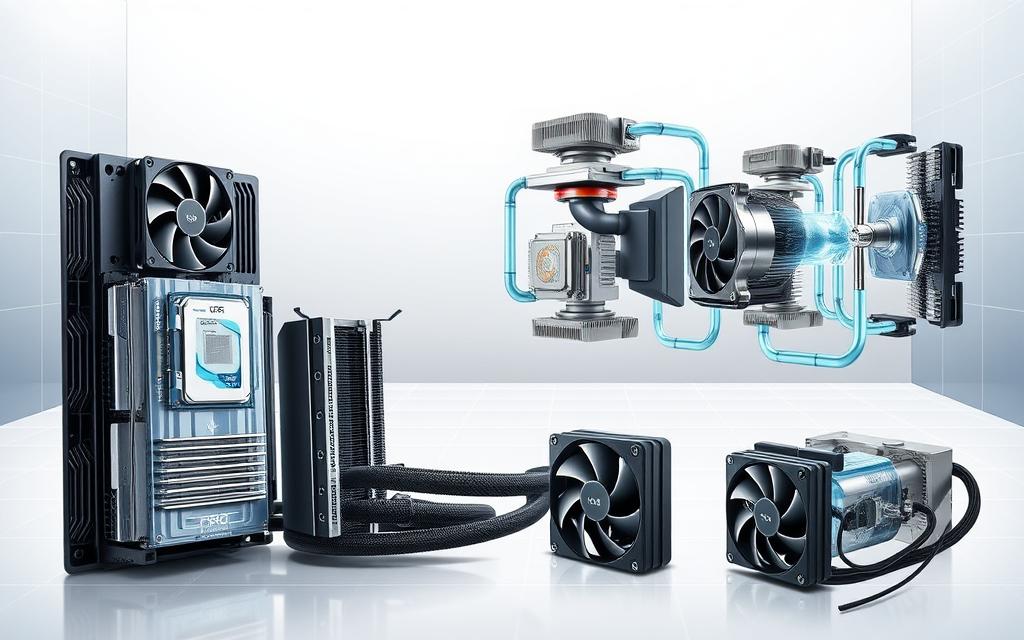
AIO liquid cooling is a straightforward solution for efficient cooling. These pre-assembled units can lower component temperatures by 10-30% compared to air cooling. Most AIO coolers are easy to install, taking about 30 minutes to set up.
AIO liquid cooling features quick installation and lower noise levels below 30 dB. It’s also a budget-friendly option for gamers.
Custom loop cooling offers complete personalisation and enhanced thermal performance. It also provides premium aesthetic options for enthusiasts.
- AIO Liquid Cooling Characteristics:
- Quick installation process
- Lower noise levels below 30 dB5
- Budget-friendly option
- Custom Loop Cooling Highlights:
- Fully customisable design
- Enhanced thermal performance
- Premium aesthetic options
Custom loop cooling is the top choice for thermal management enthusiasts. These systems allow full personalisation, potentially improving heat transfer efficiency by up to 15%.
While more complex and costly, custom loops deliver unmatched performance and visual appeal. They’re ideal for those seeking the best in cooling technology.
| Cooling Type | Installation Time | Cost Range | Performance |
|---|---|---|---|
| AIO Liquid Cooling | ~30 minutes | £70-£200 | Excellent |
| Custom Loop Cooling | Several hours | £300-£1000 | Outstanding |
Your choice depends on your skills, budget, and performance needs. Liquid cooling can be 2-10 times more effective than traditional cooling methods6.
For serious gamers aiming for peak system performance, liquid cooling is a compelling option. It offers superior cooling and potential for system optimisation.
Benefits and Drawbacks of Different Cooling Solutions
Choosing a gaming PC cooling solution requires careful consideration of performance, cost, and maintenance. Gamers must grasp the differences between air and liquid cooling technologies. This knowledge helps in making an informed decision about cooling performance options.
Performance Considerations in Cooling Systems
Liquid cooling excels in thermal management, outperforming traditional air cooling methods7. It prevents CPU and GPU throttling, ensuring steady performance during intense gaming8.
This technology can maintain reasonable clock rates almost indefinitely. Such capability is vital for high-performance computing7.
Cost and Installation Complexity
Air cooling systems are typically more budget-friendly9. Mid-range air coolers cost between £50 and £100, appealing to cost-conscious gamers8.
Liquid cooling systems are pricier but offer better thermal performance. They also provide more options for aesthetic customisation9.
Maintenance and Longevity
Air cooling systems need minimal upkeep, mainly periodic dust removal9. Liquid cooling systems require more attention to maintenance.
Closed-loop systems rarely need liquid refills8. Open-loop systems need liquid replacement every 1-2 years8.
With proper care, liquid cooling systems typically last 3-7 years8. Your choice depends on performance needs, budget, and willingness to maintain7.
- Closed-loop systems rarely need liquid refills8
- Open-loop systems require liquid replacement every 1-2 years8
- Typical lifespan ranges from 3-7 years with proper maintenance8
Installation and Setup Requirements
Liquid cooling installation needs careful planning and system compatibility knowledge. Choose components that match your PC’s specs for a successful setup. Most coolers offer mounting brackets for Intel and AMD platforms.
Focus on radiator placement and fan configuration. Place the radiator at the case top for best cooling. Set fans to intake cool air or exhaust hot air.
A 240mm radiator is ideal for cooling both processor and graphics card10. Thermal paste application is vital for heat transfer. Use a rice-grain sized amount for proper conductivity1112.
Install the pump by tightening screws gradually to spread thermal paste evenly11. Connect the pump’s 3-pin cable to the CPU_OPT or AIO_PUMP header11.
An ATX Mid-Tower case or larger is best for components and airflow12. Use a splitter for multiple fans connected to the CPU_FAN header11.
Always do a leak test before full operation to avoid system damage10. This ensures your liquid cooling setup is safe and effective.
FAQ
What is liquid cooling and why is it important for gaming PCs?
How does liquid cooling differ from air cooling?
What are the main types of liquid cooling systems?
Is liquid cooling worth the investment for a gaming PC?
What skills are required to install a liquid cooling system?
How often does a liquid cooling system need maintenance?
What are the potential risks of liquid cooling?
Can liquid cooling be used with any PC case?
What components can be cooled with a liquid cooling system?
How much does a liquid cooling system cost?
Source Links
- https://www.geekom.co.uk/how-to-choose-water-cooled-gaming-pc?srsltid=AfmBOopw3gaAyTyNeYkMkXJRnVQVjuWMMi5ZcPvO07ACJUoj0R7-_hSN
- https://www.clxgaming.com/blog/pc-parts-benchmark/mastering-art-of-liquid-cooling-in-your-pc-deep-dive-guide?srsltid=AfmBOoqQY6Atd8-rVXrx0RaS7MULJjLnGL6SN1Syu4KH8lxBVUWpcMiQ
- https://habibitech.ae/blogs/latest-gaming-news/the-ultimate-guide-to-liquid-cooling-for-gaming-pcs?srsltid=AfmBOormdCgc_45je77hTgBitnv_uPs1S9m3ToZ_oi8rgyEvOfTQCF8I
- https://www.thegamer.com/pc-water-cooling-explained-beginners-guide/
- https://habibitech.ae/blogs/latest-gaming-news/the-ultimate-guide-to-liquid-cooling-for-gaming-pcs?srsltid=AfmBOoo5VKSiZ5kuhI1Iu6wyyidL_ewM3lJb_6fgz5vvD2kTDnE7nJdN
- https://www.kingston.com/en/blog/gaming/air-vs-liquid-cooling-pc-builds
- https://www.asetek.com/liquid-cooling/gaming-enthusiasts/air-vs-liquid/?srsltid=AfmBOopqdSsfoUEmiWn5HdK7Qfa3mBlGHTrXx2xV1xJ63brzRNtTRmVU
- https://uk.crucial.com/articles/pc-builders/water-cooling-vs-air-cooling
- https://www.ibuypower.com/blog/pc-building/liquid-cooling-vs-air-cooling-pcs?srsltid=AfmBOorQB9lFWhxtst3hdcXUiyzNyLWty84sdcHMt3Nr4JVHhIU-fqlQ
- https://www.forbes.com/sites/antonyleather/2016/10/31/how-to-build-a-liquid-cooled-gaming-pc/
- https://www.coolermaster.com/en-global/guide-and-resources/how-to-install-a-liquid-cooler-in-your-pc/
- https://www.wikihow.com/Build-a-Liquid-Cooling-System-for-Your-Computer

